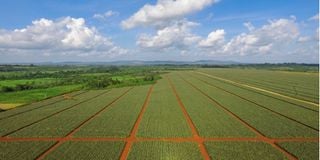Del Monte launches biofertilizer facility

Del Monte's new biofertilizer facility will turn pineapple residues into biofertilizers.
What you need to know:
- Pineapple firm is keen on transitioning to the circular economy.
- Del Monte Kenya said the model derives value out of waste.
Pineapple processing firm, Del Monte Kenya, has launched a new biofertilizer facility in the country to turn pineapple residues into biofertilizers as part of its sustainability agenda.
The pineapple producer, marketer and distributor is keen on transitioning to the circular economy as it explores new and sustainable practices.
The new facility will see more waste turned into biofertilizers.
“As the largest single exporter of Kenyan products, we are proud to contribute to the advancement of sustainable practices through initiatives like the biofertilizer plant,” said Wayne Cook, Del Monte Kenya’s Acting Deputy Managing Director.
The company said the model derives value out of waste through recycling, reuse, and repair.
This, the company said, will be a positive contribution to tackling challenges of pollution, climate change, and biodiversity loss.
Del Monte pointed out the numerous opportunities for its crop residues, whose use they are actively finding new ways of maximising.
“We believe that by being at the forefront of innovative pineapple residue utilisation, we can change the future of the industry worldwide. We see our operations at Del Monte Kenya as the forefront of this future,” Mr Cook said, noting that the initiative will also create more jobs.
The company has further said that should the initiative be successful, it will be expanded for use and sale to other growers in East Africa.
“As Del Monte Kenya embarks on this transformative journey. It does so with a deep commitment to nurturing sustainable practices that benefit both its team members and surrounding communities,” said Cook.
According to Del Monte, the company employs more than 6,500 Kenyans directly, and generates approximately 28,000 additional jobs through other companies associated with its activities.
Last year, the company exported 3,800 containers of pineapple products and other tropical fruits and beverages through the port of Mombasa, and paid Sh1 billion in taxes.




